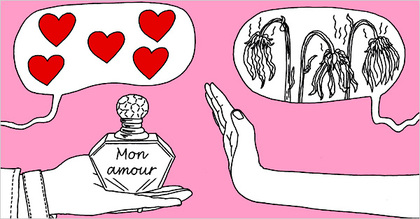Perfume Tolerance & Consumption Is Down A Notch or Two in the US {The 5th Sense in the News} {Scented Thoughts}

There is an article in the New York Times that attempts to interpret the drop in sales and perfume-wearing in the US which was reported recently by the NPD Group.
Article is The Sweet Smell of NothingSome comments:
Interestingly, this exacerbation of invisible social tensions between people who are wearing and smelling perfume in the public space seems to be more characteristic of North America and Canada and has been frequently covered in the press in that region (this specificity was not expounded upon in the article).
Taking a step back, one could think that it may be linked to over-sensitization and change of sensibilities as a result of anti-smoking policies in public spaces. Some people have noted that while they did not use to notice cigarette smoking so much twenty or thirty years ago, they have been made to be hyper conscious of the smell today. New social boundaries have been defined where volatiles are concerned and perfume may be logically following suit....
This lack of ease towards fragrance wearing may also translate potentially a sense of anxiety regarding the lack of transparency on ingredients used in perfumes in the context of a green consciousness movement gaining momentum. If this is a factor, then it would be purely irrational since natural ingredients are never safer than synthetic ones in and of themselves and both kinds of ingredients need to be checked on a case by case basis.
A good counter-argument to the singular perfume issue is that food stuffs which are loaded with synthetic flavors do not elicit the same collective responses of intolerance, say to the fake smell of strawberry in your Cheerios or the artificial hazelnut smell in your coffee. But with a little campaigning, one feels sure that one could feel quickly disgusted by the pungency of fruit juices that reek of watermelon and guava and moreover color your tongue red or blue. Please not not uncork your bottle in my presence and spit out that unseemly chewing-gum. In this case, anxieties and suspicions transferred more readily onto the topic of genetically engineered grains.
It seems at the very least that there is some element of social conformism or political correctness at work: anticipating disagreeable reactions (that have been publicized and dramatized by some media) and deciding to preempt potential hostility (or legal suits at this stage).
As the anecdotes and data assembled in the article show, consideration for the other is a key motivation in choosing not to wear fragrance. Wearing less fragrance does not necessarily mean not wanting on a personal level to wear or experience perfume. It could point to a future Japanese style of evolution where people do not wear them as much as smell them, yet are not scared by them wholesale. When a new social norm is thrown like that in the public space and when people do not conform, it can quickly be interpreted and perceived as a breach of social etiquette.
Incidentally, the article by Natasha Singer in the New York Times is mostly one-sided and gathers information about people who indeed correspond to ideas of people who would not want to wear perfume. She interprets the trend as that of a mounting minority. No counter-factual data or analysis was brought in. No testimonials from people criticizing this no-perfume trend were brought in. No international analysis to reinforce or weaken her point. Sometimes it feels like some so-called objective reportages in the NYT are disguised op-eds.
On the other side of the people of good will who fear they might hurt the social fabric and personal relationships by wearing perfume are people who complain about allergies and have become over-sensitive to perfumes. Is this due to an authentic physical reaction to new ingredients? Is it psychological and a symbolic expression of social tensions? Some physicians have noted that direct allergies to perfumes are very rare. Allergies to perfume in people who are already susceptible to environmental issues like asthmatic persons is more common.
For centuries, the sense of smell has been the privileged medium to express strong disgust and dislike and this seems simply to have a biological base. "He stinks", "Je ne peux pas le sentir" (I cannot stand the smell of him). Studies show that couples who consult marriage therapists often report not being able to stand the smell of their spouse. Bottled perfume might be just one expression of social tensions rather than the real culprit. It is a privileged means for expressing social tensions as it readily builds on images and feelings of class differences and social distinction. This may be one of the reasons why it is pinpointed over the smell of beer or fries and more willingly demonized.










It's not the tolerance, it's the overproduction of fruity florals. EVERYONE is sick of them. I'm sure there are a people who have allergies, but I'm also sure that people who don't like certain things, from nuts to wheat to perfumes, and who haven't learned to express their beliefs and opinions well enough to support the opinions, declare a medical drama to get others take care of them without question.
Yes, I am sadly aware of this new American tendency to demonize perfumes. I sincerely hope it's just passing hysteria. Perfume is the one passion I have, and quite honestly, I am up till here with some people's excessive - I would say, dictatorial - "sensitivity" to it. I'm sorry if my comments offend someone - sorry, but regrettably, not surprised - but it's a matter of the old "your freedom ends where my begins." And so far, it seems I am the only one who has been doing all the deference. I never meant to go on a rant, but I feel very strongly about my endangered right to indulge in my passion, and I would hate to think that - while I am forced to show every consideration towards the "terminally scent sensitive" - I seldom get any reciprocity.
Contemporary American and Canadian "perfumes" cause severe illnesses, including migraine, asthma and seizures. The scents you prize so much are primarily based on benzene, and you probably love the high you get from them more than any smell associated with them.
Keep your chemicals out of my lungs and my brain.
Get a clue. You're hurting people. Keep it out of the workplace, and out of any place where people are forced to be near you (i.e. theaters.) Limit your pollution to your own space.